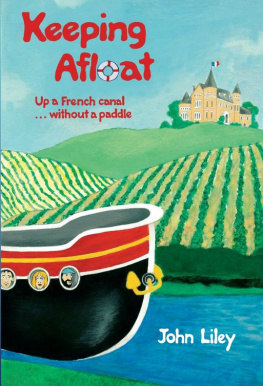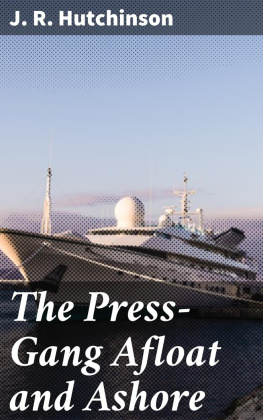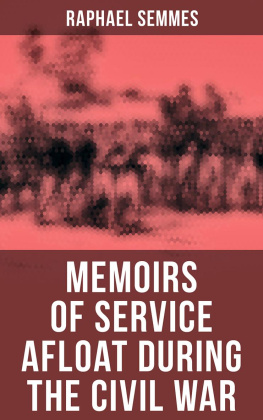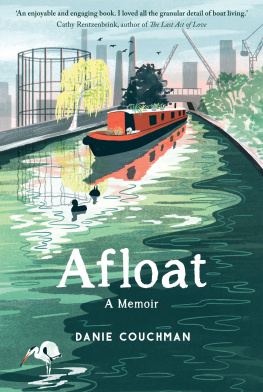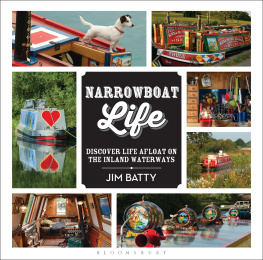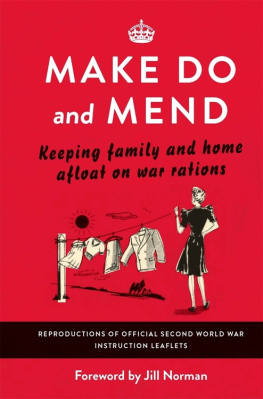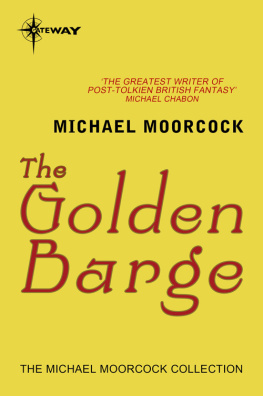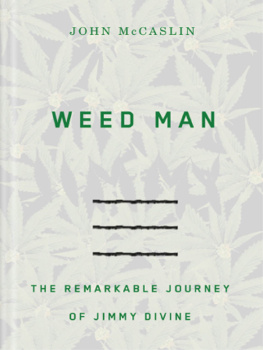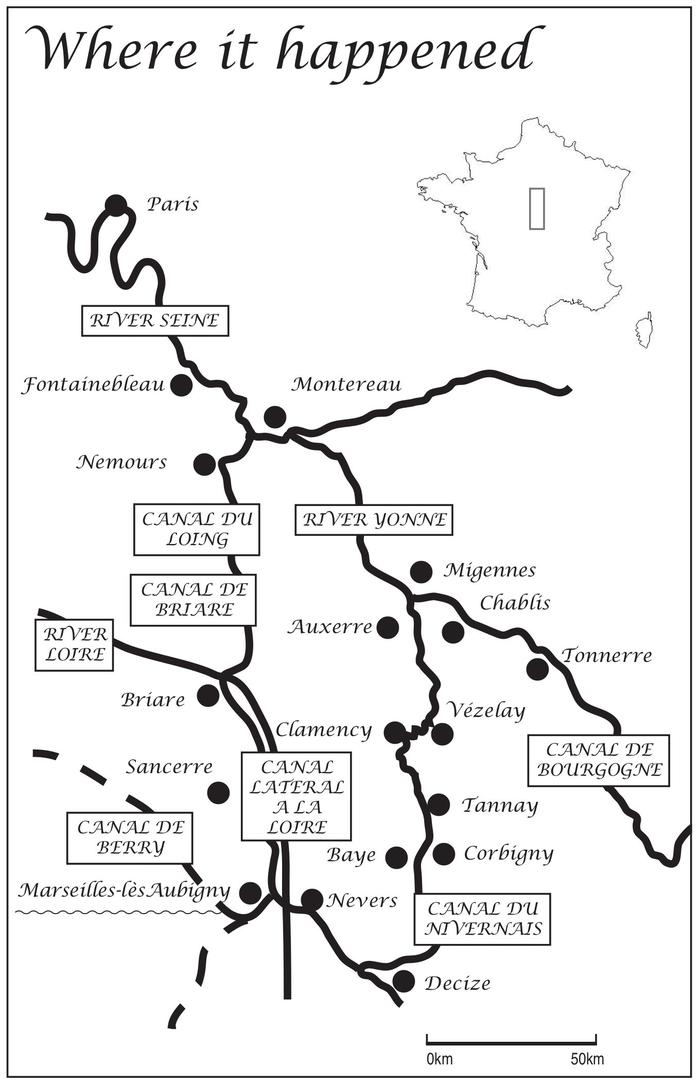V oices carry over water. Surprising things may be overheard, even on a canal. Hes a funny bugger isnt he? came to me once, with the ego-puncturing follow-up: Laughs at his own jokes and doesnt listen to a single . word you say. At Marseilles- ls-Aubigny , many years ago, it happened yet again.
We had set up in business, the group of us, with a passenger-carrying barge on Burgundys western edge. And, straight away, we were struggling. The money had gone, mine certainly had, and customers were few. In a strange land, a good deal stranger than wed imagined it to be, those were bothersome times.
The country beside the canal there, of farmland often, provides glimpses of the sprawling upper Loire. It is agreeable if largely unremarkable, with Marseilles-ls-Aubigny itself, within sight of a cement works, one of the lesser spots. On the way, though, there are finer sights: vineyards on the hillsides of Sancerre, poplars shading the old towing path, eagles over the cornfields. It helps, if following this route, not to be in a hurry.
A motor boat was passing, a rakish thing, with assertive-looking people on board and seriously slanted windows. She was, without doubt, making for the Mediterranean, taking her chance amongst the freight barges and bashing about in the locks. Her crew, if they were typical, would be finding the canal system tiresome.
We might as well stop, came a voice. We can moor against that old black barge over there. Ask that cretin in the wheelhouse if he can help.
Oh, well press on, the first voice continued. Leave him alone. He wouldnt be able to help, you can tell. Looks a real canal-type idiot. Anyone with a barge like that must be a nutcase anyway.
It takes one to know one. I might have responded, but for some reason found myself trying to compose that in French. As to the nutcase part, I was beginning to wonder if he was right.
T he business with the barge developed out of desperation. The others involved, being richer, or at least in salaried employment, had been intrigued enough to join for the ride. So we formed a company to move the project on. It was launched formally, if thats the word, one foggy autumn evening in an office off Oxford Street in London.
Our initial meeting was interrupted, in a tradition that would develop, by the arrival of the cleaning woman. As an example of the surprises lying ahead this was by no means a big one; but we were startled all the same. As if in a pantomime, the door shot open, a sack of rubbish arrived, then in she came. Headscarf rampant, vacuum cleaner at the ready, she was complaining about the lights and the need to turn them off when we went. If we did not, Mister someone we had never met would be having our guts for garters.
The intruder retreated as the accountant, who was presiding, put on a withering look and willed her out of the door. The office had been rented for the evening but, knowing more than we did, if not the cleaning womans boss, our man kept his coat on throughout. There was trouble with the heating apparently and it got no better as the hours went by.
There were eight in our company. Some were old pals; some Id bumped into, friends of friends or contacts through work. One of us - Hector - had been found through advertising. It was a ridiculous number, of course, as those who claimed to really know about business were touchingly keen to advise. Disharmony was bound to follow, they said. Never go into such things with your pals. And so on.
I t was not a new idea. Others had tried it before, although not many, and all of those - or almost all - had been doing so in England. Few, very few indeed, ever ran a barge in France. I had, in fact, met the first of them a decade or so earlier, way back in 1964, when he came to see us at the office of a boating magazine I worked for in London. Richard Parsons was his name, and he was trying to get publicity.
He came along on the day we went to press, always a tricky time, when, with the oaths of our printers echoing down the telephone, we struggled to caption such pictures as we managed to find and get all the copy to fit. Theres some bastard in Reception, somebody said. As the new boy in our office, I was the one sent to meet him.
Richards hair, a fraction too long for the day, spoke of priorities elsewhere. Tall and amiable, he had a faintly abstracted air. His overcoat, presumably bought in France, was unusually cut, and a little too long as well. He came from Wolverhampton, he said, yet was no longer Wolverhampton. It was a manner designed for survival, I would discover; the protective shell of someone who, confronted by worries he never expected, in a land where many things are different, was aiming somehow to carry on.
Under the eye of the company commissionaire, sitting in the lobby like the recruiting poster from the First World War, we looked at Richards photos together. Small and curly ones these were. What they were of was difficult at first to make out. The Eiffel Tower offered up a clue. So the waterway must have been the Seine, while the vessel in the foreground, like a sausage with a shed on top, was presumably
the barge, Richard said. Were fitting her out. He rolled his eyes as he said this. Barge conversion, as I would discover myself one day, is a conjurors box of puzzlements, of problems unforeseen and solutions born of desperation. That it is hideously expensive as well takes even the experienced by surprise.
A wash-basin winked from one of the pictures, against a background of pipes yet to be boarded in. There was a saloon, with windows from a retired city bus, while the labour force, apparently friends from England, stood around with looks of pride in their work.
This alone was a surprise. For Brits to be working in France was not such a commonplace then. To someone as wary of foreign parts as myself they seemed extremely brave. France at the time was a far-off land. It had a different kind of culture, with a language few in Britain ever troubled to learn. The French, it was popularly understood, were haughty and uncooperative. They closed their shops at lunchtime and undercooked their meat. Those who visited the country did so, generally, in a spirit of apprehension, then seemed glad to get back.
Richard had christened his barge Palinurus - someone in Greek mythology, whose background he explained, but I immediately forgot. Prior to this, as a coal boat near Dunkerque, the name had been Ponctuel, a commitment too dangerous to continue, even for the starry-eyed.
Burgundy was the region the Palinurus would be exploring, the dukedom of the Vagabond King and the home of quality wine, although it was unusual in Britain to drink it and the general concept was vague. Burgundy, indeed, like so much else in France, was a grey area of the English mind, to be filed with Transylvania or Lilliput. It was a surprise to learn it really existed, but Richard said it was beautiful. There were waterways there apparently: both rivers and canals, and those were beautiful too.
Can you help? Richard asked again, and I said we would try. We shook hands and he left.
To our eternal discredit, we did nothing much about it. An item appeared buried in some text about developments, while the pictures, as they do with magazines, lingered in a drawer for a while; then they disappeared.

